- Home
- Kathy Reichs
The Bone Code Page 2
The Bone Code Read online
Page 2
“I’m figuring we’ll be fine here in Charlotte, but it could be a real boomer over at the shore.” Encouraging smile. “Stay tuned. I’ll be back in thirty with an update.”
The station went to another commercial break. I hit mute again and was reaching for my cell phone when it rang. Warbled, actually. After checking caller ID, I answered.
“Hey, Ryan.”
“Bonjour, ma chère.”
“You still up in Yellowknife?”
After retiring from the SQ, Ryan went into business as a PI. At the moment, he was investigating something having to do with diamond mining and claims. And one unhappy party. I didn’t ask.
“Yes, ma’am. Today’s high will be minus fourteen.”
“Celsius.”
“Ç’est frette en esti.” Translation: bloody cold. “I’m hearing reports of a wee squall down your way.”
“The models are all over the map. As usual. Some suggest Inara could hit the Carolinas. Others have her heading west to Keokuk.”
“Where’s that?”
“Iowa.”
“That’s not true.”
“It is. It’s the southeasternmost city in the state.”
Ryan ignored that. “Any chance Charlotte could be in the crosshairs?”
“Highly unlikely.”
“It has happened.”
“It has.”
“How’s the Birdcat coping?”
“Poorly. Listen, Ryan, I appreciate you checking in, but I have to finish up an analysis involving a potential child endangerment. Maybe homicide.”
“Potential?”
“It’s complicated.”
“For years, I was a cop.”
“It said so right on your badge.” Referencing one of Ryan’s favorite new lines.
“It did.”
“OK.” I organized the basics in my head. “The victim lived here in North Carolina. Last week, she was found dead in her home. An autopsy showed no evidence of trauma, but toxicology testing revealed lethal blood alcohol levels.”
“Where were the parents?”
“Off sailing the Caribbean.”
“How old was the vic?”
“The detective zings straight to the core.”
“Former detective.”
“Right. The victim—her name is Tereza—came to the U.S. via a Bulgarian adoption agency in 2012. At the time, the parents were told she was seven years old. But they claim to have subsequently uncovered records listing Tereza’s date of birth as 2000, not 2005. That would make her twenty when she died, not fifteen.”
“An adult, not a minor.”
“Bingo.”
“So perfectly legal to be home alone. What’s the problem?”
“Tereza told everyone she was born in 2005. The agency insists that’s the case.”
“The kid had no friends?”
“She arrived in the States speaking no English, so the parents decided on homeschooling. Over the years, that arrangement continued because of behavioral issues. Not sure what those were.”
“So your vic had little contact with anyone outside the home.”
“Exactly. She was a very small person and, at the time of her death, was claiming to be a minor, dressing like a kid, acting like a kid. The parents say it was fraud from the outset and that Tereza was a sociopath who scammed them for years.”
“Let me guess. Some DA disagrees and is determined to prosecute.”
“Child abandonment, child endangerment, negligent homicide. Who knows what else? The parents’ attorney, a guy named Lloyd Thorn, insists his clients are guilty of nothing but kindness. He says they provided Tereza with a home free of charge. That they just couldn’t take her abusive behavior any longer.”
“So they did what?”
“Took a prolonged vacation, hoping she’d move out as they’d suggested. They figured she’d be fine on her own.”
“Where are they now?”
“Under arrest in Saint Croix. Thorn contacted me yesterday after he got access to X-rays taken when Tereza suffered some sort of fall last year.”
“Are the films useful?”
“Very. I have a theory, but I want to do a little more research before I talk to Thorn. He’s phoned me four times in the last two days. The guy’s very high-pressure.”
“And I know how you respond to bullies.”
“Keep that in mind, detective.”
“Oui, madame.”
“We could lose power anytime, so I want to wrap this up.”
“Conditions are that bad?”
“Electrical outages are SOP here.”
“Ring me in a couple of hours?”
“Sure.”
“Maybe talk dirty?”
“Goodbye, Ryan.”
After disconnecting, I verified several points online. Then I turned to my osteology and genetics textbooks.
Every now and then, I got up to peer out a window. Or to check back with our folksy weatherman. Each time, Medford’s eyebrow angle was slightly more acute.
I was doing one last round with the X-rays when something bulky skittered across the lawn and slammed a wall with a muted thud. The annex went dark.
And I was as certain as I’d ever be regarding Tereza.
Time for some serious battening.
Inspired by Medford’s second bullet point and Birdie’s instinctual choice of refuge, I dragged bedding into the annex’s most interior room, a windowless closet with a low, sloping ceiling wedged below the staircase. I added my mobile and laptop, a gallon of water, a box of granola bars, my current Karin Slaughter book, and Birdie’s food and drink bowls.
A quick sandwich by flashlight, a trip to the head, then I went in search of the cat. He was not enthused about being hauled out from under the bed.
The rain started as I was descending the stairs. No timid first wave of tentative drops, the deluge came all at once, full force and sideways, like water blasting from a high-pressure nozzle.
Easing my grip, I allowed the cat to catapult from my chest into the improvised storm cellar. He shot behind a row of stacked boxes, eyes like Frisbees, fur and tail in full upright mode, an odd mewing noise rising from his throat. I crawled in with him and closed the door.
“It’s OK, Bird. We’ve got plenty of food.”
Stretching out on my makeshift bed, I tried to relax. Eventually, the cat joined me and curled at my knee. I reached down to pet him. His entire body was trembling.
For the next several hours, Birdie and I listened to the cacophony of pounding rain and howling wind, muted but unmistakably wild. I wondered how extensive the damage would be. The cat’s thoughts were undoubtedly traveling a different path.
At some point, I drifted off. Awoke to the sound of an exploding transformer.
Feeling the cat tense and resume shaking, I started to stroke him, slowly and gently. As my hand worked its magic, my thoughts looped back to my afternoon visitor.
Polly Beecroft and her sister, Harriet, were monozygotic twins, meaning they’d developed from a single fertilized egg that split early in embryonic development. Since the women shared identical DNA, they looked alike. No biggie. The chance of having identical twins is around three or four in every one thousand births.
I felt the tiniest easing of tension in Birdie’s body. My touch was having the desired effect. Or he was running out of steam.
Polly’s grandmother and her great-aunt were also identical twins, born in London in 1870. Polly had showed me a portrait of them, one named Sybil, the other Susanne Bouvier. They, too, had looked like clones of each other, and both had looked exactly like Polly and Harriet, born eight decades later.
Something shattered in the yard. Birdie’s shaking kicked back into high. I decided to think out loud, adding my voice to the stroking, partly to benefit the cat, partly to block the bedlam outside.
“Susanne and Sybil traveled to Paris in 1888, and after a month in the city, Sybil vanished without a trace. To this day, no one knows what happened t
o her.
“Polly’s grandmother, Susanne, went on to emigrate to the U.S., marry, and have children. Polly’s mother was born in 1909. Polly and Harriet came along in 1948.
“Here’s the strange part, Bird. In addition to Sybil’s disappearance, of course. Polly also showed me a picture of a death mask.”
Birdie rolled to his back. I took this as an indication of interest.
“Death masks were popular in the nineteenth century, before people had cameras. They were kind of like ceramic selfies, created to help friends and family remember the deceased.”
I made that part up, but it sounded reasonable. Birdie didn’t question my explanation.
“Polly didn’t know where Harriet had gotten the photo. And she had no idea of the mask’s current whereabouts. Are you ready for this? The death mask in Polly’s picture looked exactly like her. Like all four women.” Added as if the cat needed clarification, “The features were the same as in both sets of twins.”
Bird stretched his forelimbs upward and let his paws drop, limp.
“So why did Polly come to see me, you ask? Excellent question. She wonders if the woman depicted in the death mask could be her great-aunt, Sybil. And if so, she wants to know if I can discover what happened to her.”
Out on the lawn, a tree snapped with a dull pop. I heard a crack far overhead, then something big ratcheted across the roof.
The cat scrabbled for cover under the quilt.
We hunkered there the rest of the night, Birdie shivering, me wondering what devastation I would face in the morning.
Unaware that the storm damage would be nothing compared to that triggered by an upcoming call.
3
WEDNESDAY, OCTOBER 6
I awoke to pitch-black.
Groggy, I rose to a crouch and groped for the chain on the overhead fixture. Pulled. Nothing.
Great. Still no electricity.
Dropping back onto the improvised bed, I located my phone. The screen showed the time to be 6:22.
Morning?
I opened my hurricane-tracking app.
Inara had made landfall as a Cat 2 storm between Savannah and Charleston around nine the previous night. After a five-hour tantrum, she’d moved offshore and was now Virginia’s problem.
Good news. Charlotte had caught only her western edge.
I opened the closet door. Pearl-gray light was seeping between the closed slats of the plantation shutters, throwing off-angle slashes onto the floor.
I crawled out into the hall. Birdie, ever cautious, remained huddled in the blankets.
Inside the annex, all was quiet. No humming refrigerator or blowing AC. Outside, bird chatter high above and the staccato barking of a distant dog.
Using my iPhone for illumination, I made a quick tour of both floors. Save for a torn screen on one bedroom window, everything appeared to be intact.
Coffee was impossible, so I got a Diet Coke from the slumbering fridge, then crossed the kitchen. Despite much forceful shoving and shouldering, the back door wouldn’t budge. Encountering no such impediment in front, I stepped out onto the stoop.
As is typical following hurricanes, the air seemed extraordinarily clear and crisp. The sky, slowly brightening, was unmarred by even the tiniest of clouds.
Sharon Hall looked as if a bomb had gone off. Trees were down, and debris and vegetation covered the grounds. Uprooted shrubs lay jumbled along the manor house foundation, and a trash can hung wedged between its pillars. Two concrete urns lay shattered on the porch, soil and begonias spewing from them like innards from a squashed roach.
Slowly, my neighbors began to emerge, hesitant but game, like survivors of some B-movie apocalypse. Most were already suited up for yard work. A few pushed wheelbarrows. Many carried garden tools.
I went inside, brushed my teeth, and changed into jeans and a sweatshirt. After locating a pair of old work gloves, I joined the recovery effort, doing my bit with a very questionable rake.
Shortly after nine, word spread that the power had been restored. I took a break to return to the annex to plug in my mobile. And to rejoice. I have to admit, I’m a huge fan of electricity.
Birdie had ventured forth, startled awake when the bare bulb in his haven lit up. He was calmer, but still needed two milligrams of something to restore him to normal.
I was heading back outside when my newly connected mobile warbled. The first of three calls that day. Not the one that would send my life off-kilter.
Recognizing the number, I steeled myself. Previous conversations had shown that—I’m being kind here—Lloyd Thorn lacked certain interpersonal skills.
“Good morning, Mr. Thorn.”
“I wasn’t sure I’d get through. A real pisser, this storm.”
“We’ve just started to clean up the mess.”
“My clients are shitting their shorts waiting for your take.”
“I understand.”
“Don’t misread me. Tereza’s death is a freakin’ tragedy. But my clients did nothing wrong. It’s an outrage they’re sitting in jail.”
“Please hold while I get my notes.”
Resuming the conversation, I placed Thorn on speaker. I could hear him fidgeting impatiently, probably clicking a ballpoint pen.
“I’m somewhat limited having never examined Tereza or viewed a photo of her. But I did spend several hours with the X-rays.”
“Let’s cut to the chase.”
“In my opinion, Tereza at the time of her death was in her early to mid-twenties. I believe she had a condition called Silver-Russell syndrome, or SRS.”
“What’s that?” The clicking stopped. Paper rustled.
“A congenital growth disorder tha—”
“I went to law school, not med school. For now, just the basics.”
“SRS can explain the stunted growth.”
“Stunted?”
“Children with SRS tend to have high foreheads, small jaws, and triangular faces. But those features become less obvious with age.”
“Uh-huh.”
“There’s no specific radiological indicator of SRS. However, delayed bone age, clinodactyly, and fifth middle or distal phalangeal hypoplasia have been reported as suggestive of the syndrome.” Speaking über-slowly and purposely using medical jargon.
“What the hell’s that mean?”
“They are features that can be seen on X-rays. Which is what I had to work with and which is objective evidence. Clinodactyly refers to the abnormal curvature of a digit. Hypoplasia refers to the underdevelopment of a body part, in this case, of portions of the little finger.”
“Tereza had all that?”
“She did.”
“How’s this relevant?”
“It can explain her extremely short stature.”
“Short stature in adults?”
“Yes. Especially if growth abnormalities aren’t treated postnatally.”
“Like that would have happened in Bulgaria. How common is this SRS?”
“Stats put the occurrence somewhere between one in three thousand and one in one hundred thousand births.”
“That’s about as useful as a tit on a nun.”
Unable to disagree, I didn’t respond.
“You said congenital. This thing’s inherited?”
“Yes. But the genetics are unclear. Autosomal dominant, autosomal recessive, and X-linked inheritance models have been reported, but without going into—”
“Yeah, don’t.”
Having had my fill of Thorn’s abrasive manner, I did.
“It’s thought that loci—think genes—on chromosome eleven play a major role in SRS. But chromosome seven may also—”
“You’re saying Tereza was a dwarf because of wonky genes.”
“I wouldn’t put it in quite those words.” Wondering precisely where this jerk did go to law school.
“So she was an adult, not a kid. In her twenties.”
“Yes.”
“Not fuckin’ fifteen.”
&
nbsp; Definitely not Harvard.
“You’re gonna put all this on paper?”
“I’ll send a full report.”
“When?”
“When it’s finished.”
“You know, one time this little psycho drowned the family puppy. Another time, she set fire to the house. I could go on.”
Info added to spur me to quicker action?
“Anyway, great stuff, doc. I’m gonna get this asshole prosecutor on the horn right now.”
I didn’t envy the hapless DA whose phone was about to ring.
* * *
Despite the gloves, I developed an epic assortment of blisters. At noon, I returned to the annex to treat them.
My mobile lay on the counter, fully charged at last. The little green icon showed one voice message. My best friend, Anne Turnip.
The second call of the day after Thorn’s. This one not the world-tilter, either.
I listened to the directive, delivered with typical Anne melodrama.
“Call me ASAP. Like, now! As soon as you hear this.”
A few words about my BFF.
Anne has emerald eyes and long blond hair, its color now maintained through the magic of chemistry. She is leggy-tall and, despite an aversion to exercise and all forms of sport, has remained as thin as the day we met. A very long time ago.
After downing a somewhat warm peach yogurt, I hit call back.
“Oh, God, Tempe! You’ve got to come!” Anne’s tone made Birdie seem tranquil in comparison.
“Where are you?”
“At the beach house. Now that the weenie boy-cop at the connector finally let me onto the island.” Vowels reflecting her Alabama birth and Mississippi schooling, broadened further by the moment’s indignation. “You wouldn’t believe the Gestapo—”
“How does it look?”
“Devastated! I need help!”
“Take a deep breath.”
Long pause. Then, “Right. You’re absolutely right. I’m sounding eighty-proof bonkers.”
“The house is still standing?”
“Yes.”
“Your roof is still on?”
“Most of it.”
“The roads are open?”
“Yes.”
“Do you have power?”
“Not yet. Jesus, Lord, nothing’s working. The damn commode won’t flush!”

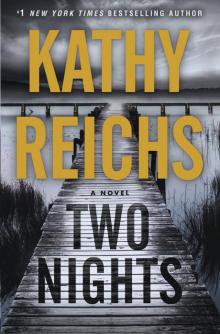 Two Nights
Two Nights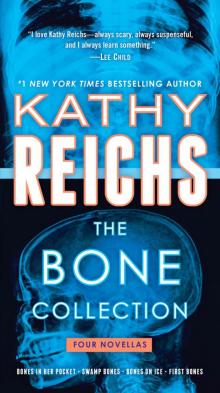 The Bone Collection: Four Novellas
The Bone Collection: Four Novellas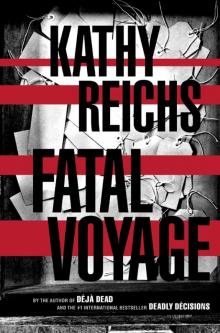 Fatal Voyage
Fatal Voyage 206 Bones
206 Bones Bones to Ashes
Bones to Ashes Terminal
Terminal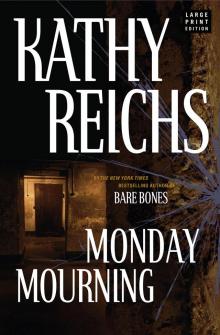 Monday Mourning
Monday Mourning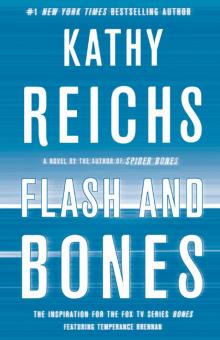 Flash and Bones
Flash and Bones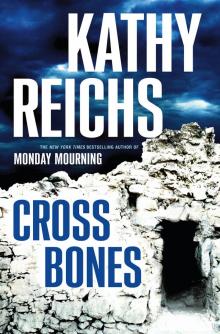 Cross Bones
Cross Bones Devil Bones
Devil Bones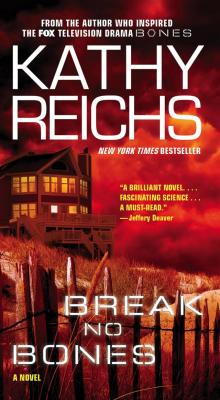 Break No Bones
Break No Bones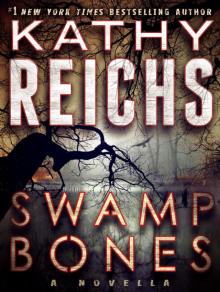 Swamp Bones
Swamp Bones Déjà Dead
Déjà Dead Shock
Shock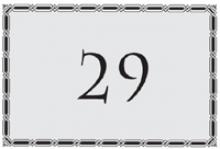 Spider Bones
Spider Bones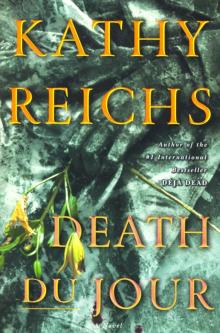 Death Du Jour
Death Du Jour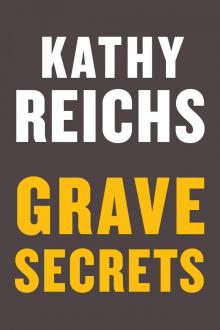 Grave Secrets
Grave Secrets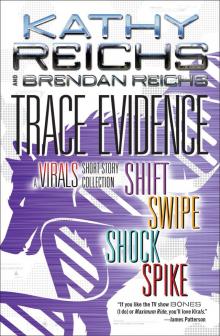 Trace Evidence: A Virals Short Story Collection
Trace Evidence: A Virals Short Story Collection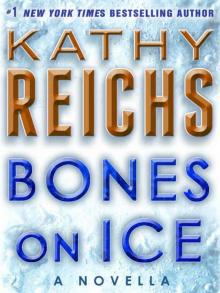 Bones on Ice
Bones on Ice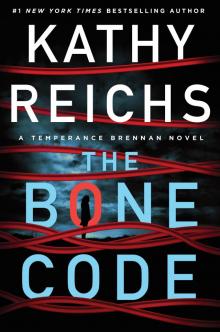 The Bone Code
The Bone Code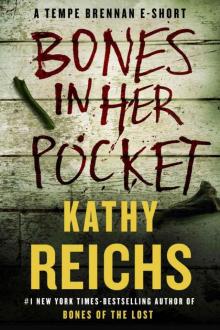 Bones in Her Pocket
Bones in Her Pocket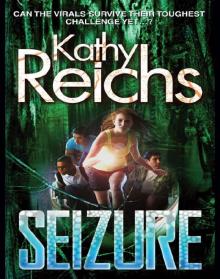 Seizure:
Seizure: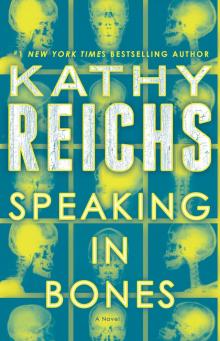 Speaking in Bones
Speaking in Bones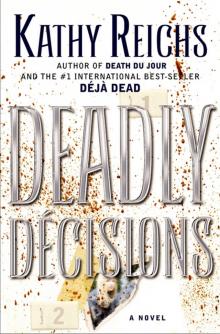 Deadly Decisions
Deadly Decisions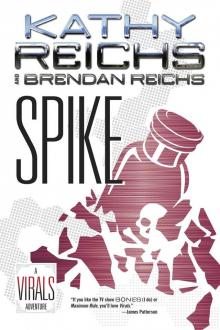 Spike
Spike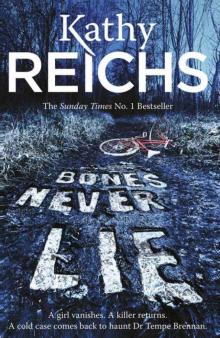 Bones Never Lie
Bones Never Lie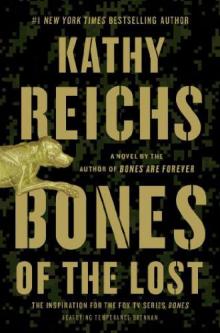 Bones of the Lost
Bones of the Lost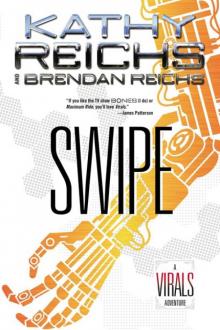 Virals 03.5 - Swipe
Virals 03.5 - Swipe Exposure
Exposure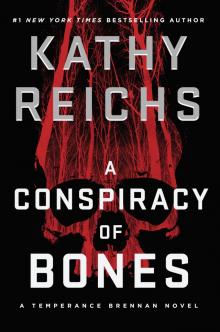 A Conspiracy of Bones
A Conspiracy of Bones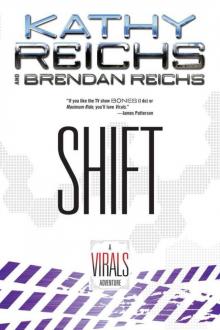 Shift (tory brennan)
Shift (tory brennan)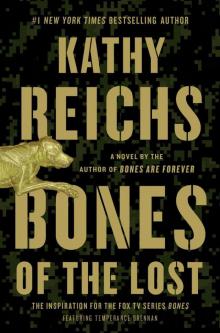 Bones of the Lost: A Temperance Brennan Novel tb-16
Bones of the Lost: A Temperance Brennan Novel tb-16 Virals tb-1
Virals tb-1 Bones Are Forever tb-15
Bones Are Forever tb-15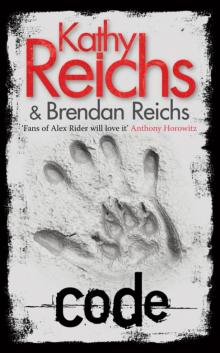 Code tb-3
Code tb-3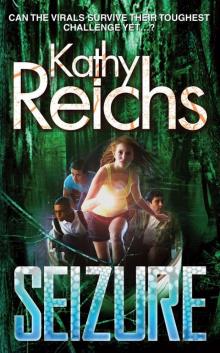 Seizure tb-2
Seizure tb-2 Deadly Descisions
Deadly Descisions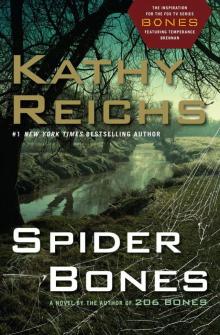 Spider Bones: A Novel
Spider Bones: A Novel